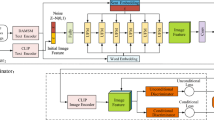Abstract
Automatically generating realistic and natural high resolution images from text descriptions is a complicated problem in the cross-modal research field. Recently, multi-stage conditional generative adversarial networks based on word attention are the mainstream of Text-to-Image generation. A close examination of these methods reveals two fundamental issues. Firstly, the granularity difference between the words and local image features makes the words cannot accurately express the local image features. Second, the discriminators cannot extract enough image information, which will result in poor discrimination effect. In this paper, we address these issues by proposing an adaptive cross-modal attention generative adversarial network (ACMA-GAN). Specifically, we design (1) an adaptive word attention module, which can reform the granularity of words and mine the context information of words; (2) a feature alignment module, which uses the pre-trained CNN model to improve the feature extraction ability of discriminator. Extensive experiments on CUB-200 and MS-COCO datasets demonstrate that our method is superior to the existing methods.
This work is supported in part by the National Natural Science Foundation of China (Grant No. 62020106012, 62106089).
Access this chapter
Tax calculation will be finalised at checkout
Purchases are for personal use only
Similar content being viewed by others
References
Frolov, S., Hinz, T., Raue, F., Hees, J., Dengel, A.: Adversarial text-to-image synthesis: a review. Neural Netw. 144, 187–209 (2021)
Goodfellow, I., et al.: Generative adversarial nets. In: Advances in Neural Information Processing Systems, vol. 27 (2014)
Heusel, M., Ramsauer, H., Unterthiner, T., Nessler, B., Hochreiter, S.: GANs trained by a two time-scale update rule converge to a local Nash equilibrium. In: Advances in Neural Information Processing Systems, vol. 30 (2017)
Lee, M., Seok, J.: Controllable generative adversarial network. IEEE Access 7, 28158–28169 (2019)
Lin, T.-Y., et al.: Microsoft COCO: common objects in context. In: Fleet, D., Pajdla, T., Schiele, B., Tuytelaars, T. (eds.) ECCV 2014. LNCS, vol. 8693, pp. 740–755. Springer, Cham (2014). https://doi.org/10.1007/978-3-319-10602-1_48
Liu, B., Song, K., Zhu, Y., de Melo, G., Elgammal, A.: Time: text and image mutual-translation adversarial networks. In: Proceedings of the AAAI Conference on Artificial Intelligence, vol. 35, pp. 2082–2090 (2021)
Mirza, M., Osindero, S.: Conditional generative adversarial nets. Computer Science, pp. 2672–2680 (2014)
Miyato, T., Koyama, M.: cGANs with projection discriminator. arXiv preprint arXiv:1802.05637 (2018)
Qiao, T., Zhang, J., Xu, D., Tao, D.: MirrorGAN: learning text-to-image generation by redescription. In: Proceedings of the IEEE/CVF Conference on Computer Vision and Pattern Recognition, pp. 1505–1514 (2019)
Reed, S., Akata, Z., Yan, X., Logeswaran, L., Schiele, B., Lee, H.: Generative adversarial text to image synthesis. In: International Conference on Machine Learning, pp. 1060–1069. PMLR (2016)
Salimans, T., Goodfellow, I., Zaremba, W., Cheung, V., Radford, A., Chen, X.: Improved techniques for training GANs. Adv. Neural. Inf. Process. Syst. 29, 2234–2242 (2016)
Schuster, M., Paliwal, K.K.: Bidirectional recurrent neural networks. IEEE Trans. Sig. Process. 45(11), 2673–2681 (1997)
Szegedy, C., Vanhoucke, V., Ioffe, S., Shlens, J., Wojna, Z.: Rethinking the inception architecture for computer vision. In: Proceedings of the IEEE Conference on Computer Vision and Pattern Recognition, pp. 2818–2826 (2016)
Tan, H., Liu, X., Li, X., Zhang, Y., Yin, B.: Semantics-enhanced adversarial nets for text-to-image synthesis. In: Proceedings of the IEEE/CVF International Conference on Computer Vision, pp. 10501–10510 (2019)
Wah, C., Branson, S., Welinder, P., Perona, P., Belongie, S.: The Caltech-UCSD Birds-200-2011 dataset (2011)
Xu, T., et al.: AttnGAN: fine-grained text to image generation with attentional generative adversarial networks. In: Proceedings of the IEEE Conference on Computer Vision and Pattern Recognition, pp. 1316–1324 (2018)
Xu, T., Feng, Z., Wu, X.J., Kittler, J.: Adaptive channel selection for robust visual object tracking with discriminative correlation filters. Int. J. Comput. Vis. 129, 1359–1375 (2021)
Xu, T., Feng, Z., Wu, X.J., Kittler, J.: Toward robust visual object tracking with independent target-agnostic detection and effective Siamese cross-task interaction. IEEE Trans. Image Process. 32, 1541–1554 (2023)
Xu, T., Zhu, X.F., Wu, X.J.: Learning spatio-temporal discriminative model for affine subspace based visual object tracking. Vis. Intell. 1(1), 4 (2023)
Yin, G., Liu, B., Sheng, L., Yu, N., Wang, X., Shao, J.: Semantics disentangling for text-to-image generation. In: Proceedings of the IEEE/CVF Conference on Computer Vision and Pattern Recognition, pp. 2327–2336 (2019)
Zhang, H., et al.: StackGAN: text to photo-realistic image synthesis with stacked generative adversarial networks. In: Proceedings of the IEEE International Conference on Computer Vision, pp. 5907–5915 (2017)
Zhang, H., et al.: StackGAN++: realistic image synthesis with stacked generative adversarial networks. IEEE Trans. Pattern Anal. Mach. Intell. 41(8), 1947–1962 (2018)
Zhu, M., Pan, P., Chen, W., Yang, Y.: DM-GAN: dynamic memory generative adversarial networks for text-to-image synthesis. In: Proceedings of the IEEE/CVF Conference on Computer Vision and Pattern Recognition, pp. 5802–5810 (2019)
Author information
Authors and Affiliations
Corresponding author
Editor information
Editors and Affiliations
Rights and permissions
Copyright information
© 2023 The Author(s), under exclusive license to Springer Nature Switzerland AG
About this paper
Cite this paper
Zhou, L., Wu, XJ., Xu, T. (2023). ACMA-GAN: Adaptive Cross-Modal Attention for Text-to-Image Generation. In: Lu, H., et al. Image and Graphics . ICIG 2023. Lecture Notes in Computer Science, vol 14358. Springer, Cham. https://doi.org/10.1007/978-3-031-46314-3_9
Download citation
DOI: https://doi.org/10.1007/978-3-031-46314-3_9
Published:
Publisher Name: Springer, Cham
Print ISBN: 978-3-031-46313-6
Online ISBN: 978-3-031-46314-3
eBook Packages: Computer ScienceComputer Science (R0)




